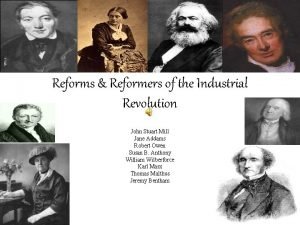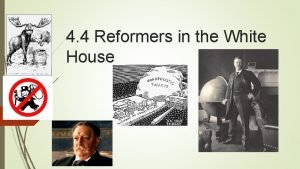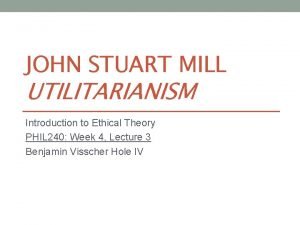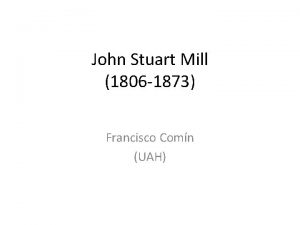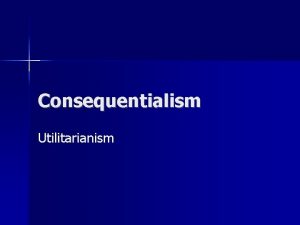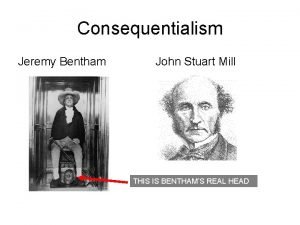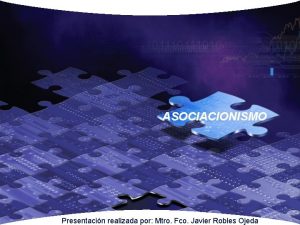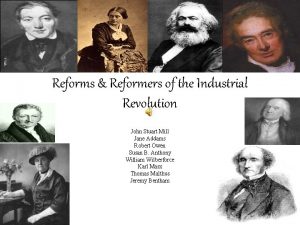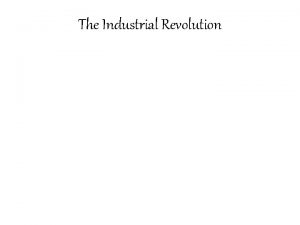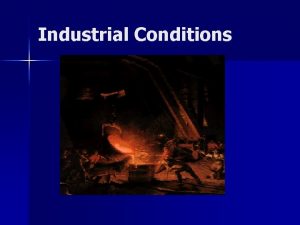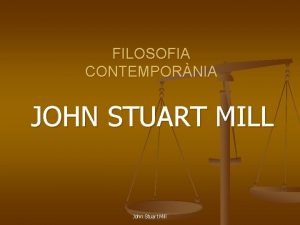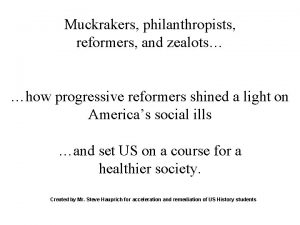Reforms Reformers of the Industrial Revolution John Stuart











- Slides: 11

Reforms & Reformers of the Industrial Revolution John Stuart Mill Jane Addams Robert Owen Susan B. Anthony William Wilberforce Karl Marx Thomas Malthus Jeremy Bentham

John Stuart Mill • Led the Utilitarian movement • Questioned unregulated Capitalism & wanted to divide profits between workers & owners • Favored cooperative agriculture & women’s rights • Urged government to do away with differences in wealth between classes

Jane Addams • Ran settlement houses (like Hull House in Chicago) for urban poor • Worked in the abolition movement to end slavery world wide • Worked for women’s rights including suffrage (right to vote) • Worked with other reformers such as Horace Mann to end child labor & educate children

Robert Owen • Built low cost housing for his factory workers • Prohibited children under 10 from working in his mills & provided free schooling • Founded a utopian community in New Harmony, Indiana for his workers

Susan B. Anthony • Worked for Women’s Rights and in 1848 attended the Women’s Rights National Convention in Seneca Falls, NY • Worked with abolitionists such as Frederick Douglass to end slavery and improve minority rights • Supported education for women and equality in the workplace

William Wilberforce • Viewed slavery as morally wrong and economically as a threat to workers • Urged British Parliament to end slavery in its colonies by 1807 & in its entire empire by 1833 • Urged other countries such as the U. S. , Puerto Rico, Cuba, & Brazil to end slavery

Karl Marx • In 1848 he and Friedrich Engels wrote the Communist Manifesto to inspire workers to revolt against business owners • Believed that Communism was a complete form of Socialism where all private property ceased to exist and all things would be owned by the public • Argued that all history was a struggle between the workers (Proletariat) and their employers (Bourgeoisie)

Thomas Malthus • Believed that the urban poor would always stay poor unless they learned how to control their population • Stated that the limiting factor for expanding populations was a steady food supply • Agreed with David Ricardo that there would always be a permanent under class

Jeremy Bentham • Supported the idea of Utilitarianism, where ideas should be judged on their usefulness • Believed that government should promote the greatest good for the greatest number of people • Agreed that individuals should be free to pursue their own interests

The Union Movement • Labor Unions represented workers’ rights and used collective bargaining & strikes to get better conditions and pay from employers • Early unions were persecuted under the Combination Acts in the US & Great Britain which made them illegal. By 1875 Great Britain made labor unions legal

Luddism: A Violent Response to the Industrial Revolution • The fictitious General Ned Ludd began breaking into factories and smashing machines in the early 1800 s • Ludd’s followers called themselves Luddites and thought that by destroying the machines they could increase their pay and get back lost jobs • British Parliament made machine breaking a capital offense (death penalty) to try and stop the Luddites • Neo-Luddism is still around today
 Reformers in the industrial revolution
Reformers in the industrial revolution Members of the progressive movement generally supported
Members of the progressive movement generally supported What is this image
What is this image Lesson 4 reformers in the white house
Lesson 4 reformers in the white house Mugwumps were reformers who
Mugwumps were reformers who Stalwarts and mugwumps
Stalwarts and mugwumps Hedonism and utilitarianism
Hedonism and utilitarianism John stuart mill (1806-1873)
John stuart mill (1806-1873) John stuart mill teoría
John stuart mill teoría Principle of utility john stuart mill
Principle of utility john stuart mill John stuart mill
John stuart mill James mill asociacionismo
James mill asociacionismo
